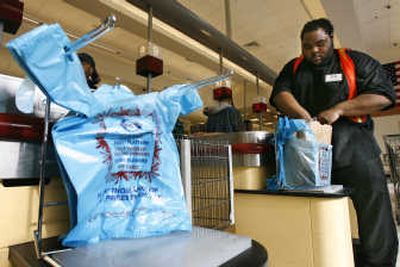Grocers rethink plastic bag

WASHINGTON – The inevitable question faced by shoppers at the grocery checkout, how to tote their food home, may soon get simpler.
Faced with a growing push in some states and cities to ban or limit use of plastic bags, many grocers encourage consumers to recycle bags or bring their own. At least one, Whole Foods Market Inc., plans to do away with the bags. But many grocers report that about 90 percent of shoppers still ask for plastic. And the bag makers, a billion-dollar industry, oppose bans, calling instead for consumers to reuse or recycle the bags. They favor recent legislation that encourages recycling of bags but doesn’t ban them.
Plastic bags have a split personality: They draw shoppers with their durability and light weight, but environmentalists consider them a scourge, tangled in tree branches or swirling in waterways where they can be scarfed up by unsuspecting aquatic creatures.
“Taking that old familiar checkout question ‘Paper or plastic?’ to ‘What type of reusable bag do you have today?’ would be great,” said Kate Lowery, a spokeswoman for Whole Foods, which said Tuesday it will eliminate plastic bags from its 270 stores in the United States, Canada and Britain by April.
Some states and municipalities have tried to curb the use of the bags or keep them from becoming litter. The New York City Council passed a law this month requiring stores to collect and recycle bags, following a similar law in California.
San Francisco passed the nation’s first bag ban, which took effect in November. The only plastic bags allowed for big grocers are made of compostable material. Similar regulations are being considered nationally, though proposals in places like Baltimore and Annapolis, Md., foundered last year.
The United States lags behind many other countries in placing limits on plastic bags. Ireland and Germany levy fees for every bag handed, and several African nations have set thickness requirements that have effectively banned the flimsy thin bags that float in the air. Earlier this month, China, the world’s fastest growing economy, banned free plastic shopping bags and encouraged people to use cloth ones. “This issue is not going away. It is not necessarily going to take over the plastic bag market in a year or two, but it is indicative of a real trend,” said Allen Hershkowitz, director of the solid waste program at the Natural Resources Defense Council, an environmental group.
Plastic bags are a favorite of grocers because of their price, about 2 cents per bag compared to 5 cents for paper. Used widely since the 1970s, environmentalists estimate 500 billion to a trillion bags are produced annually worldwide. Made from fossil fuel-based polymers, the bags are virtually indestructible, taking years to break down and commonly ending up in landfills.
Grocers say they are not deaf to the public’s concern about litter, and some have implemented recycling programs and many also sell reusable bags made from canvas or recycled plastic.
Another option is plastic bags that are compostable, often made of starches that will break down over time. But their cost – 10 cents to 15 cents each, means most grocers won’t buy them. The San Francisco ban, for example, allows for the use of compostable bags, but most stores have just switched to paper, according to the California Grocers Association.
The plastics industry argues that the shift to paper is worse for the environment. To make paper bags, trees must be cut down. And it takes seven fuel-burning trucks to ship paper bags to retailers compared to just one for the same amount of plastic bags, according to the Plastics Division of the industry group American Chemistry Council.
“Plastic bags are a very good environmental choice,” said Keith Christman, senior director of packaging for the group.
Yet paper bags can be made from recycled material, a more environmentally friendly process, Hershkowitz said. And simply recycling plastic bags that will be then used for other means, like decking, will not reduce the number produced each year, he said.